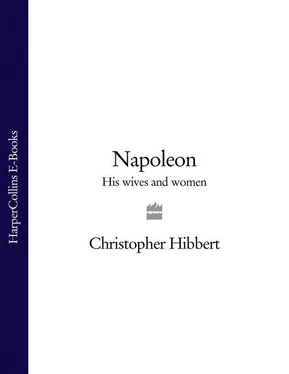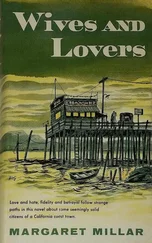The mother was a frail-looking young woman, a wife since the age of fourteen, with a pale, eager countenance, dark hair, large dark eyes and a patrician nose, shy but determined and capable and extremely thrifty. One French observer described her as being ‘by far the most striking-looking woman in Ajaccio’. She did not often smile, and she spoke Italian in a Corsican dialect.
Her family, the Ramolini, originally came from Lombardy and were proud to number among their ancestors the counts of Coll Alto; but her more recent forebears had been settled in Corsica for some 250 years. Her father was a civil engineer who had died when she was a child. Soon afterwards, her mother had been remarried to a Swiss officer serving in the Genoese marines, Captain Franz Fesch, whose son, Joseph Fesch, was to become a cardinal and French ambassador in Rome.
The Buonapartes were also of old Italian stock, an ancestor, Guglielmo di Buonaparte, having been a distinguished councillor in Florence in the thirteenth century. ‘We thought ourselves as good as the Bourbons,’ Napoleon was to say, ‘and on the island we really were. There are genealogists who date my family from the Flood, and there are people who pretend that I am of plebeian birth. The truth lies between the two. The Buonapartes are a good Corsican family, little known since we have hardly ever left our island, but much better than the coxcombs who take it upon themselves to denigrate us.’ His enemy, the diplomatist and Romantic writer, François-René de Chateaubriand, was to comment sardonically that Napoleon was ‘so lavish with French blood because he did not have a drop of it in his own veins’.
A sixteenth-century member of their family had sailed for Corsica, when the island was being colonized by the Genoese, in the hope of fortune if not fame. His descendant, Letizia’s husband Carlo, was a tall young man, who had studied law at Pisa; charming in manner though vain and frivolous by nature, socially ambitious and compulsively intrigant . He was to become well-known for the elegance of his clothes and for the sword he wore as evidence of his noble rank: he was known on the island as ‘Buonaparte il magnifico ’; he himself added to his name the aristocratic di . He took to wearing cerise jackets, buckled shoes, embroidered stockings, puce knee breeches and a powdered wig with a black ribbon. It meant much to him fare bella figura .
Two years after his marriage, he had taken his wife to meet Pasquale Paoli, the guerrilla leader whose life’s work it was to drive the Genoese from Corsica. It had been a long and hard journey on horseback to Paoli’s headquarters at Corte, a small town on high ground in the middle of the island. Letizia had clearly been intrigued and impressed by the great patriot who, in turn, had obviously been attracted by the sixteen-year-old girl whom he had asked to sit down to play cards with him and by whom he had been soundly beaten.
Carlo had also created a favourable impression upon Paoli, who had asked him to go to Rome on his behalf to do his best to ensure that, when an attack was made on the Genoese island of Capraia, in order to draw Genoese troops away from the Corsican ports still in their hands, there were no reprisals by the papacy which had given Corsica as well as Capraia to Genoa. The Vatican was disposed to listen sympathetically to Carlo’s submissions; but Genoa now offered to sell Corsica to the King of France, ten thousand of whose troops landed to take possession of the island.
Carlo, who had by now returned to Corsica, once more left Ajaccio to join Paoli, taking Letizia with him. In the tangled evergreen shrubs of the maquis, the Corsican guerrillas had defeated the French who retreated from the island with the loss of five hundred prisoners and their commander in disgrace. They came again next year, however, more than twice as many of them, under a more gifted and resolute commander.
Once again, Carlo – accompanied once more by Letizia, pregnant with Napoleone and carrying her first baby, Giuseppe, in her arms–had left Ajaccio for the maquis and had established his family in a cave on Monte Rotondo, the highest ground on the island. Whenever she had emerged from the cave, ‘bullets whistled past [her] ears,’ she wrote later. ‘But I trusted in the protection of the Virgin Mary, to whom I had consecrated my unborn child.’ In the middle of May, a French officer had clambered up Monte Rotondo under the protection of a white flag. He had brought a message from his general: following Paoli’s defeat at Ponte Nuovo, Corte had fallen to the French; the guns were silent; Paoli himself was sailing into exile in England; all Corsicans under arms were free to return to their homes.
Carlo had accepted the offer and had taken Letizia and Giuseppe back to Ajaccio where, by the time Napoleone was born, the Corsican flag had been replaced by France’s fleurs de lys on a blue ground.
Puny as Napoleone had seemed at first – born so suddenly before his time – and worried as his mother had been that he might die, as two of her babies had already done, he soon grew stronger, being fed at his mother’s breast as well as by a wet-nurse, a sailor’s wife named Camilla Ilari.
In contrast with his quiet, retiring elder brother, Giuseppe, Napoleone grew into a rather rumbustious boy, often provoking Giuseppe into rowdy wrestling matches on the floor until their mother took all the furniture out of one of the rooms and left the children there to be as noisy and rough as Napoleone liked. She was not, however, an over-indulgent mother, insisting on daily baths, regular attendance at Mass, and often giving them a sharp buffet when they were tiresome or naughty. Napoleon himself, so he later confessed, was particularly unruly and stubborn as a child. ‘I would hit Giuseppe,’ he said, ‘and then force him to do my homework. If I was punished and given only plain bread to eat I would swap it for the shepherd’s chestnut bread, or I would go to find my nurse who would give me some little squids I quite liked.’
He recalled one particularly severe beating:
My grandmother was quite old and stooped [he was to tell his natural son, Alexandre Walewski], and she seemed to me and my sister, Pauline [born in 1780], like an old fairy godmother. She walked with a cane; and, although she was fond of us and gave us sweets, that did not stop us walking behind her and imitating her. Unfortunately she caught us doing this and told our mother who, while loving us, would stand no nonsense. Pauline was punished first because skirts are easier to pull up and down than trousers are to unbutton. That evening she tried to catch me also but I escaped. The next morning she pushed me away when I tried to kiss her. Later that day she said, ‘Napoleone, you are invited to lunch at the Governor’s house. Go and get changed.’ I went upstairs and began to get undressed. But my mother was like a cat waiting for a mouse. She suddenly entered the room. I realized, too late, that I had fallen into her trap and I had to submit to her beating.
His mother was, Napoleon said of her, ‘both strict and tender’; and he readily acknowledged the influence she had over the development of his character. ‘I was very well brought up by my mother,’ he was to say. ‘I owe her a great deal. She instilled pride.’ The children’s father sometimes worried that his wife was too strict with them; but she insisted that bringing up the children was her business, not his. She was masterful in her way.
All in all, Napoleone’s was a happy childhood, and a very familial one. The big, dark house was large but fully occupied behind its shuttered windows. Napoleone, his parents and siblings lived on the first floor. The ground floor was occupied by Letizia’s mother-in-law and an uncle, Luciano, Archdeacon of Ajaccio, who was often incapacitated by gout; while, on the second floor, lived various cousins who were, on occasions, a quarrelsome lot of whom Carlo would have been pleased to be rid had he felt able to turn them out. Relations between the two families went from bad to worse after a tub of slops was thrown out of a second-floor window on to one of Letizia’s dresses hanging out to dry below. Although Letizia saw to it that they did not live extravagantly, the Buonapartes did live quite well. Carlo had inherited two good vineyards and both pasture and arable land from his father, while Letizia had brought to the marriage over thirty acres, a mill and a large oven in which bread was baked from corn ground in the family mill. Milk and cheese came from the family’s goats, oil from their olives, tunny from the fishermen trawling the Golfe d’Ajaccio. Uncle Luciano was proud to say that the Buonapartes had ‘never paid for bread, wine or oil’. Napoleone, however, was not much interested in food – except for cherries, which he consumed with relish. Otherwise, he ate what was put before him without enthusiasm or comment.
Читать дальше











